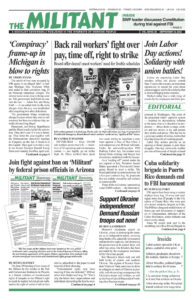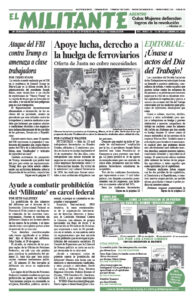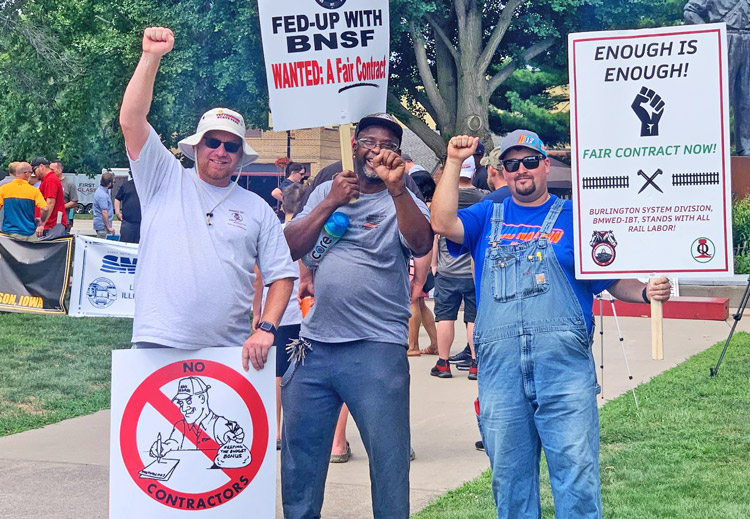PITTSBURGH — Over 115,000 rail workers across the U.S. — members of 12 operating and maintenance unions — can legally go on strike Sept. 16. These workers have spent two years trying to negotiate a contract against a bloc of five Class 1 rail companies and 30 local railroads. Under the anti-working-class 1926 Railway Labor Act, the unions were barred from striking and forced into mandatory mediation with the bosses.
As a “cooling off” period under the act expired in July, President Joseph Biden appointed a Presidential Emergency Board to avert a strike. The board published recommendations for a five-year contract Aug. 16, proposals that are widely viewed by rail workers as unacceptable.
Three of the rail unions, representing some 15,000 workers — the International Association of Machinists, Transportation Communications Union and Brotherhood of Railway Carmen — have reached tentative contracts with the carriers, including a 24% pay raise.
But the largest rail unions, representing the operating crafts, as well as the majority of others, haven’t signed on. Jeremy Ferguson, president of the International Association of Sheet Metal, Air, Rail and Transportation Workers — Transportation Division (SMART-TD), told the media that the Presidential Emergency Board didn’t agree with the unions’ call for “improvements to quality-of-life issues, including addressing the draconian carrier attendance policies and the need for more paid and scheduled time off.”
“A fair and appropriate contract would address what matters to us: quality of life,” Michael Paul Lindsey II, a 17-year employee of Union Pacific in Pocatello, Idaho, wrote in the online industry journal Railway Age. “At the end of the day, quality of life was the goal of this contract, not a 24% taxable pay increase that actually lowers our pay by 2% when adjusted for inflation.”
Under the Railway Labor Act, the unions can strike or the bosses can lock out workers if no agreement is reached within 30 days after release of the Presidential Emergency Board’s recommendations. However, Congress has the power — which it used against rail workers in 1991 —to end a strike, order the union members back to work and impose a settlement.
This meant workers had the rail companies’ demands for a three-year-long wage freeze and other concessions shoved down their throat.
“The raise recommended isn’t enough given the fact that our health insurance payments would rise considerably under these recommendations. And the price of everything is going up,” Zack Jameson, a locomotive engineer working out of western Pennsylvania and member of Brotherhood of Locomotive Engineers and Trainmen, told the Militant. “And the companies claim that our labor makes ‘no contribution’ to their extraordinary profits, and that we face none of the risks. But the profits don’t exist without us! And we’re risking our physical well-being and our lives out there.”
Jameson also pointed to recently installed Positive Train Control technology, designed to automatically slow or stop a train under certain conditions. The rail bosses claim this makes it safe now to eliminate conductors on road trains, and run them with an engineer-only “crew.” Rail workers strongly oppose the bosses’ push to slash more jobs, putting profits over safety. Crew size isn’t addressed in the national contract.
Even without imposing one-person “crews,” the rail bosses have cut the workforce by 29% over the last six years, leading to unlivable schedules and increased danger to workers and those who live near the rails.
No relief from onerous schedules
“There are no paid sick days in the recommendations, which our unions had demanded,” Robin Smith, a locomotive engineer working out of Harrisburg and member of the SMART rail union, said. “The company claims that we don’t suffer fatigue. They claim that train service crews only worked an average of 33 hours a week this year. This month I’ve worked an average of 51 hours per week! And they don’t take into account all the hours we spend ‘on call,’ waiting to come to work at any time of the day or night, and the hours we spend away from home. Last week I sat in the hotel for 23 hours and then got called to work for my seventh shift in a row. ”
“I’ve heard that the unions are organizing rallies in other areas to gather support for our demands,” Smith said. “I’m dying to have one. I’m organizing a one-woman rally with signs on my car denouncing the PEB’s pro-company recommendations.”
One of the bargaining unions, the Brotherhood of Maintenance and Way Employees, has led in organizing recent protest actions, drawing in other rail unions in Nebraska, Iowa, Illinois and Wyoming. Another rally has been called for Sept. 10 in Toledo.
Rick Leschina, a locomotive engineer in the Chicago area, said that he participated in the rally in Galesburg, Illinois, July 30 “to stand in solidarity with brothers and sisters in rail in all crafts. We show the companies that we’re standing in unity, that’s where we have our strength.”
In response to the Presidential Emergency Board proposals, he said, “all the comments I’ve heard are negative, especially taking the cap off health premiums. People are saying we don’t want more concessionary contracts.”
“I don’t think this contract will be ratified by rail workers,” Pete Gushwa, a conductor and member of the SMART-TD union in Spokane, Washington, told the Militant. “But it will go to Congress, who will impose the final settlement.”
“And I don’t think the PEB recommendations are going to stave off people quitting or attract new hires,” Gushwa added. “We’re all forced to work overtime whether we want it or not. Issues like that will now have to be fought out locally rather than nationally.”
“The problems we face, particularly the challenges of having a life outside of work, of spending time with our families, is widespread in the working class,” Chris Hoeppner, a conductor working out of Philadelphia and member of the SMART union, told the Militant. Hoeppner is the Socialist Workers Party candidate for U.S. Congress from District 3. “Rail workers need to get our voices heard. The big-business media is only going to tell the companies’ side of the story, to try and cut us off from winning allies. There are already stories in the press about how a rail strike will threaten farmers.”
“A central way we can prepare to use our unions to fight the rail bosses is giving solidarity to other union strikes and social struggles,” Hoeppner added. “We’ll strengthen their fights, learn important lessons and gain allies. The strike of coal miners against the deep concessions demanded by the bosses at Warrior Met in Alabama, just like our fight on the railroad, is critical to the whole working class. They need more people to hear about what they face and to win more support. Our unions should step up. We’ll all be the stronger for it.”
Candace Wagner is a freight conductor and member of the Brotherhood of Locomotive Engineers and Trainmen.


